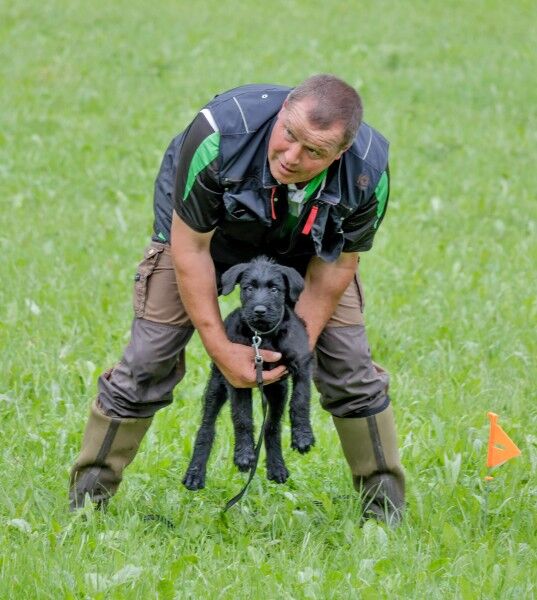Bernd Föry is one of the most renowned tracking experts in Europe and worldwide. He took the time to talk to us.
A light question first: what was the funniest thing that happened to you in connection with tracking?
I have more than one funny story to tell. But let me tell you one of my favorites: Giving a private class, I asked the handler to hold her dog’s eyes closed after indicating an article. We didn't want the dog to see the food we put down on the track that he would get for starting on the track again.
We had done this many times. One day she rewarded her dog for indicating the article. No further action from her end. „Don’t you remember?“ The handler looked at me guilty, pulled out some food out of the pocket and the next thing I notice: she’s closing her own eyes with her hand ..
One of the most difficult problems you encountered in your tracking career?
It must have been a few years ago. A desperate dog handler called me. Instead of indicating articles, his dog always ate them. He had had three surgeries already to remove the articles and there was no way the dog could have had another one. Too many scars would make another surgery dangerous. A problem we thought about and discussed a lot.
Finally we found a solution. We secured the articles in the ground - with long nails. Also, we only used articles of the size of a cell phone which the dog couldn’t swallow. We were able to reward the dog sufficient times for him to learn that his task was not to eat the articles.
At which age do you start tracking with a puppy?
As soon as the puppy had a chance to adjust to his new home. At 12 or 13 weeks our puppies are already leaving the first scent pads.
Can you track with any breed?
Generally yes. Teaching hunting dogs is sometimes a little more difficult. Some are bred to course or search in other ways that defer from tracking a scent.
Also, dogs with a short snout sometimes have problems picking up the food. This happens, for example, with some boxers. In such a case, I use food sticks which can be pulled out of the ground.
What are the three top issues that you encounter with your students?
Many dogs don’t keep a good pace for tracking. Either they are too fast or vary their pace instead of keeping it constant. Many dog handlers have troubles reducing rewards/food. Finally, handlers tend to put their dogs on very advanced tracks too early.
How do you deal with problems on the corners?
I always look at the pace of the dog first. If it’s too fast, we will deal with that. If I can outrule that pace is the reason for the dog's issues, I let the dog go over the corner by one body length. Once he does this, I correct him verbally and he gets a second chance a few steps before the corner. Most dogs will search with greater care and learn to succeed at a slower pace.
I also see quite a few handlers who reward a lot in the corners. These dogs will typically have problems coping with corners without food.
For anyone interested in more information: You give tracking seminars, right?
Yes, I do quite a bit. I keep groups of handlers with dogs small and train with 10 dogs maximum. That’s why my seminars are booked out very early. However, I always suggest that people attend my seminars for the first time without their dog. That way they can concentrate on the theory, and practice the second time around.
You work with quite a few very successful dog handlers. How did that come about?
It all started with my German Shepherd. I was looking for ways to get away from tracking with pressure – very common at that time. I rewarded with lots of food. However, my dog started to track by sight; in particular when tracking on soft dirt. That's when I came up with the idea to use little containers that I dug into the ground. It worked and soon enough many dog handlers started to be interested. That's when I started working with Team Heuwinkl, whom I'm sure many will know from Peter Scherk and Florian Knabl.
You have been active in IGP for quite some time now. Have things changed a lot in tracking over the years?
Yes. We all used to work with a lot of pressure. Things changed to a point that it seems almost everything was about the dog enjoying itself. In my opinion, we are currently overdoing it looking for perfection. We train and train to get our dogs to search meticulously. But we forget to teach them to love tracking.
What do you enjoy most about tracking?
I love to watch young dogs learn, master new challenges and enjoy tracking. Not long ago, we showed a dog, previously trained under a lot of pressure, that tracking can be fun. Very rewarding! And last but not least, it makes me happy when people I work with, succeed in competitions!
Bernd, thank you for taking the time!

